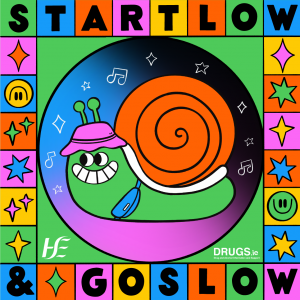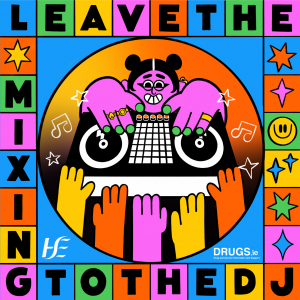We’re in the midst of festival season in the UK, and with over 50% of festival-goers saying they take drugs it’s important to know how to stay safe during this year’s events.
General harm reduction advice
It’s always safest not to use drugs at all – however, drug use does take place within the night-time economy and festival venues. It’s important that individuals that are using drugs in these settings are aware of the risks and what they can do to minimise them.
The overall message when it comes to using dr ugs in any environment is to start low, go slow. You might not have the same tolerance levels as your friends and you might not react in the same way as them. By taking a very small amount of a substance and leaving time between each use, you allow your body to adjust. As well as this, you can identify how you react to the substance – if it’s not what you expect, discontinue use.
ugs in any environment is to start low, go slow. You might not have the same tolerance levels as your friends and you might not react in the same way as them. By taking a very small amount of a substance and leaving time between each use, you allow your body to adjust. As well as this, you can identify how you react to the substance – if it’s not what you expect, discontinue use.
With regards to MDMA in crystal form, the advice is to crush, dab, wait. Crush up the crystals into a fine powder, lick the end of your finger and dab it into the powder to consume a small amount, and then wait 1-2 hours to assess the effect before taking more.
 It’s also important to avoid mixing drugs as doing so can put you at increased risk of harm. Alcohol can increase risks when mixed with any drug.
It’s also important to avoid mixing drugs as doing so can put you at increased risk of harm. Alcohol can increase risks when mixed with any drug.
For example, mixing cocaine and alcohol can create a chemical called cocaethylene, a compound which is much stronger than either substance on their own. Cocaethylene puts an increased strain on organs and takes much longer to leave the system, prolonging the effects of cocaine. Some individuals continue drinking after using cocaine to extend its effects and keep withdrawal symptoms at bay. However, this combination increases heart rate and blood pressure, putting users at heightened risk of stroke and cardiac problems.
For more information on mixing substances and especially risky combinations, check out this resource.
If you do decide to take drugs during festival season, make sure to be open with your friends as to what it is you’re taking. This way they can provide you help or alert emergency services if you need it. It’s always best to have at least one person in your group that isn’t using drugs and to avoid taking substances when you are by yourself.
Much of the festival season takes place in the height of summer, so it’s important to keep cool and stay hydrated. If someone is taking MDMA they’re likely to feel thirsty and warm. To avoid dehydration, it’s advised that you drink around a pint of water per hour. However, drinking over this amount can be dangerous and lead to a salt imbalance, so it’s equally important not to drink too much. As well as this, take breaks from dancing to allow your body to cool down.
It’s vital to know the signs of an emergency in case yourself or your friends don’t react to a substance in the way they expect. In general, the signs of an emergency are:
Mental
|
Physical
|
Responsiveness
|
Temperature
|
In the case of an emergency it’s important to remember to stay calm and offer support to the person in need – you won’t get in trouble for getting help for someone who has used drugs.
Make sure the individual is not left by themselves to ‘sleep it off’ or ‘walk it off’ and don’t let them have any drugs or food. If they are conscious, sit them down and remove layers if they are overheating. Make sure they have some water but only a pint per hour maximum. If they are unconscious, put them in the recovery position. If the individual isn’t breathing, call 999 and start performing CPR. If it’s possible, give the medics what was taken.
Before you arrive at the festival it’s wise to know where the medical tents are in case you need them. Again, you won’t get in trouble if you have to alert the medics to a drug emergency.
Drug testing
Drug testing is an essential, life-saving harm reduction service at festivals. In England, The Loop is one of the main organisations that carry out drug checking at festivals. In the past, their service has allowed festival-goers to check their substances to ensure they match buying intent. No drug is deemed ‘safe’ to take and samples given to The Loop are passed onto police to be destroyed. The Loop’s work also feeds into the identification of drug trends and the issuing of drug alerts.
Research carried out by Fiona Measham and Henry Simmons of drug checking service The Loop found that individuals using their service were likely to reduce their dosage. Furthermore, when samples weren’t what individuals expected, around ⅔ of the sample disposed of their drugs.
Drug testing at festivals usually takes one of two forms. Front-of-house drug testing allows individuals to submit their drugs for testing to ensure they’re safe and match the buyer’s intentions. However, back-of-house testing occurs only when drugs have already been confiscated.
There was concern that drug testing may not be taking place at all this year, following news that testing services at Parklife festival would have to obtain a Home Office licence. According to festival organisers, such licences can take up to 3 months to obtain and cost over £3,000 – a prohibitive fee for smaller events.
However, news emerged at the end of this week that drug testing would be taking place at Glastonbury and Reading and Leeds Festival this year – although it was confirmed that this will be taking place ‘back-of-house’.
Over in Berlin, policymakers have been praised for taking a more progressive approach to drug testing. Earlier in the month, the Senate Department for Health announced the ‘Drug Checking’ scheme which allows individuals to anonymous and free drug testing. Although the service is limited to checking cannabis, speed, ecstasy, LSD and cocaine, results are shared with the appropriate counselling centre and are available to the individual within 3 days.
Although the advice remains that it is always safer not to use drugs, it is important to know how to manage the risks involved with drug use, especially during festival season. Stay safe and check below for a list of helpful harm reduction resources.
Volteface-Harm reduction information
Drugs.ie-Reduce the harms at festivals
This piece was written by Volteface Content and Media Officer Megan Townsend. She is particularly interested in the reform of drug legislation, subcultural drug use and harm reduction initiatives. She also has an MA in Criminology from Birmingham City University. Tweets @megant2799.
